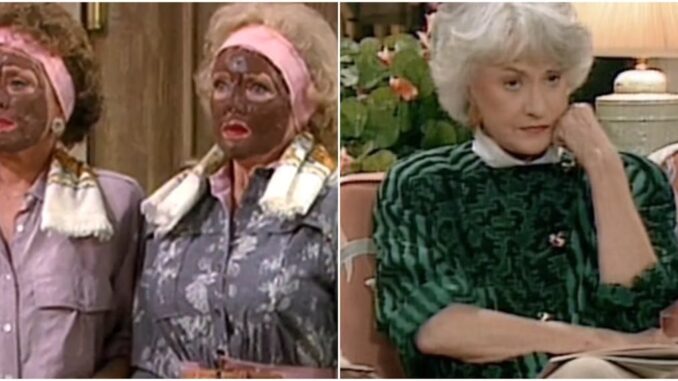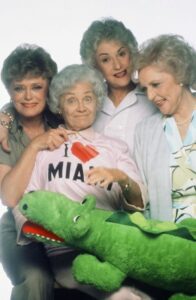
The Golden Girls was radically progressive and refreshing during its time, but 35 years later, it’s hard not to notice some glaring flaws of the show.
The Golden Girls’ enduring appeal can be attributed to its radically progressive and refreshing look at not just the lives of women “of a certain age”, but their approach to race, sex, the LGBTQ+ community, HIV/AIDS, disabilities, and a myriad of other controversial topics. It brought attention to them through humor, made them more accessible, and started dialogues television series are still having.
With that in mind, it premiered 35 years ago, and as is the case with older media, is a product of its time and cannot be divorced from its context. The characters in the series were in their 50s, 60s, and 70s, and had the opinions they had based on their generations. Now that network shows are available 24/7, fans old and new have begun to see some of the major problems the series had, from sexism to keeping all of the women’s kid count accurate. It will always be a defender of feminism, ageism, and thoroughly progressive ideals, even if it falls short on occasion.
Stanley Took Advantage Of Dorothy
One of the most prominent jokes in the series included how Dorothy and her ex-husband Stanley conceived their first child Kate. In the episode “The Accurate Conception”, Dorothy relayed to Blanche (whose daughter Rebecca was about to get inseminated at a sperm bank) how she had children in an equally unconventional way.
Dorothy informed her, “I was completely unconscious. When I came to, there was Stan carving a notch into his dashboard.” She went on to say, “He must have slipped me something”. That Dorothy relayed this information so casually was part of the reason why fans didn’t analyze the scenario for what it was; Stanley drugging and then violating Dorothy for his own personal clout.
Dorothy And Stan’s First Date Happened 5 Different Ways
Dorothy may have invented a variety of scenarios for her first date with Stan out of a combination of shame, embarrassment, and resentment. When retelling the event to either her roommates or strangers, it changed location as well as intent to fit the plotline of the episode.
In one story it happened because she was stood up at her prom, in another, it happened on Coney Island, in still another Dorothy agreed to it because she loved Stan’s car, and in the most maudlin rendition, because Dorothy felt like she was ” doing her part for the war” in the event that Stan ever got drafted. Fans had to give up on continuity and just accept that however the date really happened, Dorothy wasn’t a fan.
Rose’s Cultural Appropriation
Rose was one of the most benevolent characters in the series, and it’s difficult for fans to reconcile the sweet, mothering woman from St. Olaf with the same woman who could think nothing of putting on a Native American headdress and whooping about like she was at a pow-wow.
In another episode involving the women crashing the East Miami High Reunion, Rose snagged a few unclaimed name tags so she and her pals would look like official filming. She pretended to be a foreign exchange student “Kim-Fung Toi” who, when asked why she looked so different, explained that she was, “different on the outside, same on the inside.”
The House Layout Changed To Fit The Plot
The Golden Girls house was as iconic as the Brady Bunch home or the Cheers bar. Most of the fun of the series took place in its four walls, the only problem was those walls kept changing! Every season characters will enter from different areas that didn’t seem to have access to the exterior or sleep in bedrooms that didn’t conform to the original layout of the house.
As with most television sets, the exterior shots of the house didn’t match the interiors. Since the sets were built to maximize the effectiveness of the plotlines (such as if the women had to share bathrooms, even when they all had their own), fans could simply look past the fact that getting to the lanai became trickier and trickier.
Their Families Weren’t Consistent
It wasn’t uncommon for the women to welcome family members into their home. Dorothy often had her musician son Michael visit, Sophia hosted her sister Angela, and Blanche had her daughter Rebecca over. Over the years, however, the members in each woman’s family shifted conspicuously.

At one point Blanche only had one daughter, but then at a certain point, she had two (it didn’t help that one of the daughters was played by two different actresses). She also had three sons, although only one was ever seen on the show. Rose mentioned five children by name, but in the episode where she had a heart attack, she brought up a sixth whom she didn’t name.
Their Personal Histories Changed
As the women got to know each other as roommates, audiences learned their personal histories as they chatted over cheesecake. If fans were paying attention, they might have been able to spot when these histories changed or were altered to fit the plot of the episode.
For instance, Rose mentioned at one point that she was valedictorian of her high school and that she later graduated college. However, she enrolled in a GED class taught by Dorothy, which made little sense considering she would have needed her high school diploma to attend university. At one point she also said her last name Nylund was given to her during her adoption process, and in another episode stated it was her true maiden name.
Sophia’s Casual Racism
When Sophia was first introduced, she’d just suffered a “mild stroke”, a malady that established her character as someone prone to tactless, impulsive behavior (most of which was played for laughs). Sophia was often allowed to be a racist character, such as when she did her best imitation of a Black voice and said, “Them’s just the appetizers!” while dressed as a mammy in the series finale.
Or, when she described Lorraine’s mother and aunts as “Martha and the Vandellas” in “Mixed Blessings”, and started asking them about the sexual prowess of Black men, thus perpetuating the “Mandingoist myth” about “Black men in bed”. She may have started a dialogue, considering she was always thoroughly criticized by her roommates, but many viewers may have found the humor distasteful.
Blanche’s Southern Pride
Blanche often speaks of the South through rose-colored glasses, waxing poetic about it like a fantasy realm in her mind, full of cotillions with gentlemen asking women dressed in lace to dance. The Devereaux family owned plantations, Blanche grew up being focused on by “Mammy Watkins”, and she even referred to her father as “Big Daddy”.
At one point, she even tried to join the Daughters of the Confederacy but was denied acceptance because she was Jewish. Fans had to understand that Blanche was often willfully ignorant about the worse parts of Southern history in order to preserve its legacy in her mind as a bastion of gentility, and overcome her grief.
Rose’s Constant Beratement
Rose may not have been the intellectual titan of the four women, but she had a special sort of insight when it came to their predicaments. Whether it was through a St. Olaf story or some other form of homespun wisdom, she tried her best to apply a fresh perspective to her roommate’s problems.
Unfortunately, Rose was constantly derided, shamed, or made to feel inferior by every single one of her roommates, often for asking simple questions. Instead of being patient with her, Dorothy, Rose, and Sophia all joined in snapping at her, sometimes to the point of making her run off in tears. While it was a joy to watch Rose light up the screen, watching her constantly be ridiculed wasn’t.
Blanche Being Slut-Shamed
The series pioneered the notion that women “of a certain age” could have active, fun, and fulfilling sex lives, but Blanche’s intimate encounters were apparently too experimental and vivacious to be celebrated. She was mocked mercilessly, even by well-meaning Rose, who normally didn’t have anything bad to say about anyone.
After a time, fans might have found punchlines comparing Blanche to a tedious mattress, especially considering how much the women knew she was prone to exaggeration. For as progressive as her roommates were about their own sex lives, it only made sense for them to extend the same positivity to hers.
